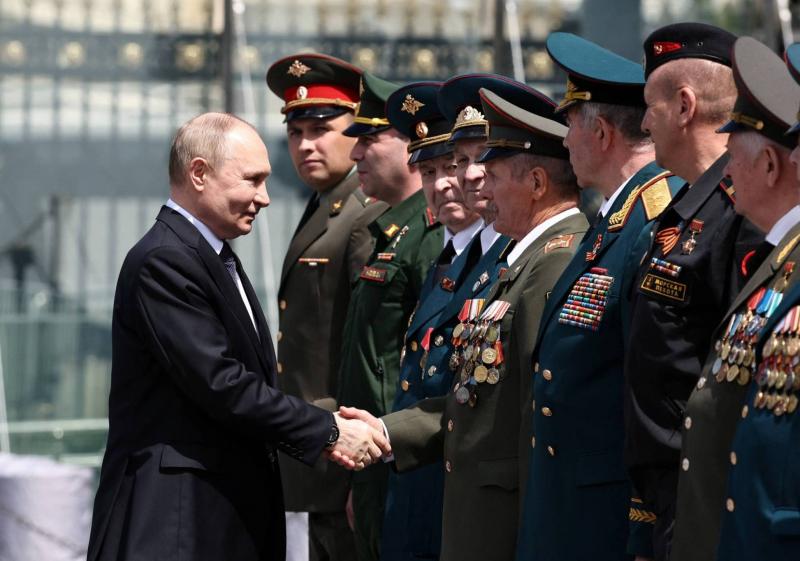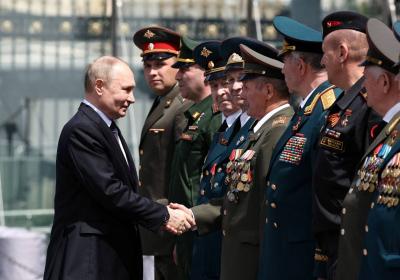In recent decades, the Middle East has given birth to warriors dreaming of exhausting the West. Through the "attacks on New York and Washington," Osama bin Laden envisioned luring the U.S. military into Afghanistan, hoping to replicate what he did to the Soviet "Red Army." He failed. America toppled the "Taliban" regime and pursued bin Laden, ultimately killing him and feeding his body to the fish. Abu Bakr al-Baghdadi emerged from Mosul, brandishing a sword of hostility towards the West, international law, and all moderation. American aircraft came for him and buried him along with his "state."
Khomeini's revolution was birthed on the line of enmity towards the "Great Satan." It began with the humiliation of Americans by taking them hostage in their embassy in Tehran. The bombing of the American embassy in Beirut, along with the Marines' headquarters, revealed both the goal and the method. General Qassem Soleimani shed the blood of American soldiers in Iraq and busied himself with severing the connections that link the West to Arab maps. Donald Trump assassinated him in Baghdad itself, yet he could not alter the fate of the maps he linked to. Iran is a major state in its region, but it cannot lead an international revolt against the West. This revolt requires a supporter from the fabric of Moscow, Beijing, or both together.
Saddam Hussein defied international and American will, and the American army later came, uprooting his regime even if under baseless pretexts. Muammar Gaddafi provoked the American empire, leading its aircraft to bomb his bedroom, leaving him in terror until his death. These attempts to exhaust the West were violent and bloody, but they were limited, lacking a supporter capable of nurturing a grand, costly revolution, and they lacked a country the size of mysterious and sprawling Russia—a Russia that bled Napoleon and shattered the arrogance of the Führer's army.
It is no exaggeration to say that the world witnessed last week an event more perilous than what Soleimani, Saddam, Gaddafi, bin Laden, and al-Baghdadi accomplished. Kim Jong Un rejoiced at the event like a child who stumbled upon his long-lost toy or a warrior who won a lucrative insurance policy. It is not simple for the Tsar to visit you as if he needs you—your artillery, missiles, and drones—and to conclude what resembles a mutual defense treaty with you, promising modern technology for your arsenal, in addition to cheap food and comrade oil.
Vladimir Putin, who visited North Korea days ago, is not at all the Putin who visited it 24 years ago. He waited long, concealing his intentions and his salivation. The wounded warrior emerging from the Soviet rubble and the KGB tunnels managed to deceive Western leaders. They were under the illusion that the man who came out of the shaky cloak of Boris Yeltsin would be satisfied with containing damage, repairing the economy, and preserving the Russian Federation. At times, they found him amiable and manageable. They never imagined they were pouring salt into his old wounds when they moved NATO pawns towards their border and attracted Ukraine, whose Slavic blood intertwined with Russian birth.
A momentous visit. The Tsar came to assert his alliance with the isolated and rejected regime suffering from Western and international sanctions. He allied with the man seated on a modest nuclear arsenal, addicted to selling missiles and unsettling his neighbors. The visitor shed his cloak on the individual who previously deceived Donald Trump, who mistakenly believed he could strike a deal with Kim Il Sung’s grandson. Trump appeared naïve in his dealings with Kim, just as the West seemed naïve in understanding the Russian spirit and reading Putin's secret dream—his dream of avenging the Soviet Union from those who managed to assassinate it without firing a single bullet.
After North Korea, Putin visited Vietnam, which welcomed Xi Jinping and Joe Biden during the same year. Vietnam leans on Russian weaponry but views China as its true threat, not America. Vietnam dreams of technology, investments, and tourists. Does the Russian visitor have anything to entice them? This is a significant question. China wants to weaken the West, but does its deeply linked economy with the global economy allow it to align with Putin in a revolt that threatens costly repercussions against the Western alliance? China dreams of a multipolar world, but does it rush to escalate confrontation with the West, or does it prefer revolution through other means?
Does China have an interest in Kim Jong Un snuggling up to the Tsar, and can Russian weapons empower Vietnam to revolt against Chinese will? Does the new front Putin opened in East Asia facilitate the retrieval of Taiwan, or does it complicate matters further?
With his visits to North Korea and Vietnam, Putin appears to be launching the second phase of a "Russian deluge," having initiated its first phase on Ukrainian and European soil two years ago. It is a grand game— a dangerous game. The Tsar is betting on the West's weakness. The man sitting in "10 Downing Street" is promised to fall within days. The master of the Élysée wavers to the music of elections. The German chancellor is an exceptionally ordinary man in extraordinary times of challenges. The U.S. is preparing to choose between a man whose memory betrays him and a man whose surprises are difficult to predict.
Months ago, the "Sennwar Deluge" shook the Middle East, but this deluge is containable. The "Putin Deluge" is broader and more perilous. Western generals assert that a great war is coming. They talk about the birth of a new "axis of evil," and they are mindful of their arsenals. Some say that Putin has opened the road back to a world of two blocs, along with a "spring of rogue states," referring to North Korea and Iran. It is difficult to predict the boundaries of the "Russian deluge." The fate of the world hangs in the balance, dependent on the wisdom of the man sitting on the throne of Mao Zedong.




